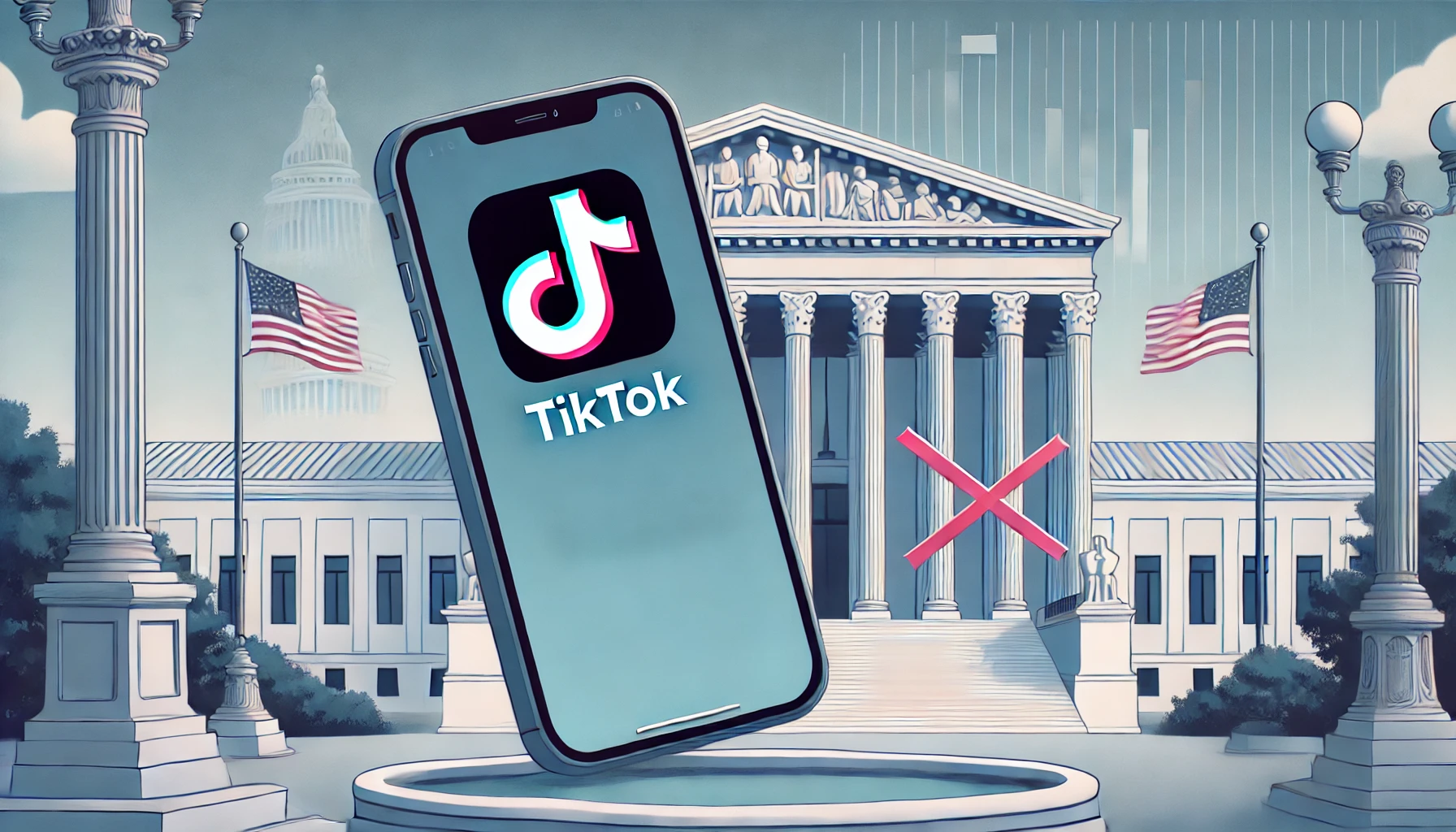Americans and Chinese Connect Through Jokes as TikTok Faces U.S. Ban
The U.S. Supreme Court has upheld a law that may lead to a nationwide ban on TikTok, sparking a wave of reactions from users across the country. Many TikTok creators have turned to humor and satire to express their frustration, while others have sought alternative platforms to continue their online communities. The impending ban has also created unexpected cultural exchanges between American and Chinese social media users, as many seek new ways to stay connected online.
Humor as a Response to the Ban
TikTok users in the U.S. have responded to the potential ban with humor, posting videos mocking the government’s concerns over national security. Many videos feature users joking about having their own “Chinese spy” watching their TikTok activity, with some saying tearful goodbyes to their imagined surveillance agents. One popular video set to Whitney Houston’s “I Will Always Love You” included an AI-generated image of a Chinese military officer as users bid farewell to their “assigned spy.”
The sense of loss has led some TikTok users to look for ways to continue using the app despite the ban. Many have shared methods to bypass restrictions, such as using Virtual Private Networks (VPNs) to mask their location. However, it remains unclear whether VPNs will effectively allow users to access TikTok if the platform is banned from U.S. app stores and servers.
The Rise of Alternative Apps
As the potential TikTok ban looms, millions of users have begun migrating to other platforms. One of the most popular alternatives is Xiaohongshu, also known as “RedNote.” The app, which translates to “Little Red Book,” is a Chinese social media platform that has skyrocketed in popularity among American users in recent days. RedNote allows users to share short videos and text-based posts, making it a natural alternative for TikTok users seeking a new online community.
RedNote, which does not have China’s usual internet firewall restrictions, has allowed for direct interactions between American and Chinese users, an uncommon occurrence given China’s tight control over digital platforms. Over 700,000 Americans have joined RedNote in just two days, making it the most downloaded free app in the U.S. App Store.
The sudden surge in American users has led to an explosion of cultural exchange. Many Chinese users have welcomed Americans to the platform, sharing insights about their lives and even playfully “charging” newcomers a “cat tax,” requesting photos of their pets in exchange for advice on navigating the app. Some users have also taken the opportunity to ask for help with English homework, leading to thousands of responses from American users.

Social Media Giants Prepare to Benefit
As TikTok faces an uncertain future, rival companies such as Meta (which owns Instagram and Facebook) and Google (which owns YouTube) are preparing to absorb its massive user base. Executives at Meta have discussed ways to attract TikTok influencers, with plans to enhance Instagram’s Reels feature to make it more appealing to short-video creators. YouTube has similarly expanded its Shorts feature, increasing the maximum video length to three minutes in an effort to capture former TikTok users.
Both companies are actively recruiting TikTok content creators, offering financial incentives and support to help them transition to new platforms. YouTube recently invited TikTok influencers to a “Shopping Boot Camp” to encourage them to use YouTube’s monetization features. Analysts predict that Instagram Reels and YouTube Shorts will see significant user growth if TikTok is banned, with Instagram expected to gain the largest share of former TikTok users.
Concerns Over Free Speech and Censorship
The TikTok ban has also sparked a broader debate over free speech and digital censorship. The U.S. government has cited national security concerns as the reason for the ban, arguing that TikTok’s parent company, ByteDance, could be forced to share user data with the Chinese government. However, TikTok has repeatedly denied these claims, stating that it operates independently and does not store U.S. user data in China.
Many legal experts warn that banning TikTok could set a dangerous precedent. Anupam Chander, a professor of law and technology at Georgetown University, noted that such a ban would make the U.S. government appear to be restricting free speech rather than protecting national security. “When the United States shutters a massive free expression service, it will make us the censor and put us in the unusual position of silencing expression,” Chander said.
Additionally, the TikTok ban has highlighted the complex relationship between the U.S. and China. While the two governments continue to clash over trade, technology, and security issues, the unexpected rise of RedNote as a cross-cultural platform demonstrates that ordinary citizens are still eager to communicate and share experiences despite political tensions.
The Future of Social Media in the U.S.
As TikTok users await final confirmation of the ban, many are preparing for a future without the app that has shaped internet culture for years. Some will migrate to alternative platforms like RedNote, while others will transition to Instagram, YouTube, or other emerging social media sites. Meanwhile, tech giants and startups alike are racing to capture TikTok’s displaced audience, hoping to benefit from the platform’s massive user base.
This article is based on the following articles:
https://www.bbc.com/news/articles/c983lr756xwo

Background Information
What Is TikTok and Why Is It Popular?
TikTok is a social media app that allows users to create and share short videos, often featuring music, dance, comedy, or educational content. It was launched in 2016 by the Chinese company ByteDance and quickly became one of the most popular apps in the world. Today, TikTok has over 1 billion users globally, including around 170 million in the United States.
One of the reasons for TikTok’s success is its algorithm, which suggests videos based on a user’s interests. This makes the app highly engaging, as people often find themselves watching videos for hours. TikTok also supports trends, challenges, and viral content, allowing users—especially young people—to gain widespread attention very quickly.
Who Owns TikTok, and Why Is This Important?
TikTok is owned by ByteDance, a company based in China. This has raised concerns among U.S. lawmakers and officials because China has strict laws requiring companies to cooperate with the government on security matters. U.S. officials worry that ByteDance could be forced to share American users’ data with the Chinese government, though TikTok has denied these claims.
Because of these concerns, the U.S. government has tried to regulate or ban TikTok multiple times over the past few years. Other countries, like India, have already banned TikTok due to similar concerns about data privacy and security.
Why Is the U.S. Government Concerned About TikTok?
There are three main concerns that U.S. officials have about TikTok:
- Data Privacy – U.S. officials fear that TikTok might collect personal information about users, such as their location, browsing habits, or messages, and share it with the Chinese government.
- Misinformation and Influence – Some lawmakers worry that TikTok could be used to spread false information or influence political opinions, especially during elections.
- National Security Risks – Since TikTok is controlled by a Chinese company, U.S. officials fear that China could use the app to gather intelligence on American citizens or even shape public discussions.
Because of these concerns, the U.S. Congress passed a law in 2024 that required ByteDance to either sell TikTok to a non-Chinese company or face a ban. The case eventually reached the Supreme Court, which recently upheld the law, making the ban more likely.
What Is the Supreme Court and Why Does It Matter?
The Supreme Court of the United States (SCOTUS) is the highest court in the country. It has the final say on important legal issues, including whether laws are constitutional. In this case, the Supreme Court was asked to decide whether the government’s TikTok ban was legal. Since the Court upheld the law, TikTok must now either find a U.S. buyer or stop operating in the United States.
The Supreme Court’s decision has had major consequences, as millions of TikTok users now face losing access to the app. This has also created an opportunity for other social media companies, like Instagram and YouTube, to attract former TikTok users.
What Are Instagram Reels and YouTube Shorts?
Since TikTok became popular, other social media companies have introduced their own short-video features to compete with it:
- Instagram Reels: A feature on Instagram that allows users to create and watch short videos, similar to TikTok.
- YouTube Shorts: A section of YouTube that focuses on short-form videos, allowing creators to make content up to three minutes long.
These platforms are now trying to attract TikTok users and influencers by offering financial incentives and promoting new features that are similar to TikTok.
What Is RedNote (Xiaohongshu)?
RedNote, also called Xiaohongshu, is a Chinese social media app that is gaining popularity in the U.S. due to the TikTok ban. It was originally designed as a shopping and lifestyle platform, where users in China could share fashion tips, product reviews, and travel experiences. However, as TikTok users search for alternative apps, many have started using RedNote as a replacement.
One interesting feature of RedNote is that it does not have the same internet restrictions as other Chinese apps, allowing users from the U.S. and China to communicate freely. This has led to a wave of cultural exchange, with American and Chinese users joking, sharing memes, and even helping each other with language learning.
How Do VPNs Work, and Can They Be Used to Avoid the Ban?
A Virtual Private Network (VPN) is a tool that can hide a user’s real location by making it appear as if they are accessing the internet from another country. Some TikTok users have suggested using VPNs to bypass the ban by making it look like they are in a country where TikTok is still available.However, it is unclear whether this method will work in the long term. If the U.S. government blocks TikTok’s servers and transactions, VPNs alone may not be enough to keep the app functioning.
Please subscribe to Insight Fortnight, our biweekly newsletter!
